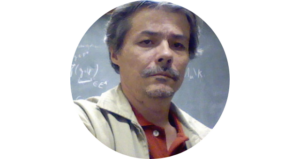
Residency Period: 08/01/2007 to 07/31/2008
Ricardo Hiroshi Caldeira Takahashi obtained a bachelor’s and master’s degree in Electrical Engineering from UFMG in 1989 and 1991, and a doctorate in Electrical Engineering from UNICAMP in 1998. He has been a professor at UFMG since 1992, working since 2002 in the Department of Mathematics. He develops research in the areas of Control Theory and Optimization Theory, in which he has been studying mainly the themes of Multiobjective Optimization and Evolutionary Computation. His curriculum records the authorship of 69 articles published in scientific journals and 115 works in conference proceedings, which have received so far 620 citations according to the Web of Science database, or 776 citations according to the Scopus database. He supervised or co-supervised fifteen doctoral theses and sixteen master’s dissertations already concluded. He was chair of the 6th International Conference on Evolutionary Multicriterion Optimization (EMO 2011) and the 1st Luso-Brazilian School of Evolutionary Computation (ELBCE 2009), and is a member of the organizing committee of the next IEEE Congress on Evolutionary Computation (CEC 2013). He is also currently a member of the Evolutionary Computation Technical Committee of the IEEE Computational Intelligence Society. From 2007 to 2009, he coordinated a CAPES / GRICES project for international cooperation. He is currently coordinating an FP7 international cooperation project financed by the European Community, within the framework of Marie Curie Actions. He was one of the editors of the Manual of Evolutionary and Metaheuristic Computation (co-edition of the Editora da UFMG and the Press of the University of Coimbra) and of the Enciclopédia de Automática (publication of the Brazilian Society of Automatics).
CONTRIBUTIONS TO THE EPISTEMOLOGY OF TECHNIQUE: CONTROL THEORY AND THEORY OF EVOLUTIONARY SYSTEMS
Traditionally, the term Philosophy of Technique has not been used to refer to epistemological studies in the various fields of science dedicated to the study of objects built by man (or even to the study of the possibility of building such objects). Instead, such terminology has designated the study of technique as praxis. Perhaps such an asymmetry of meanings between the terms Philosophy of Technique and Philosophy of Science can reveal an important gap in the field of Epistemology. Until now, epistemological studies have been reserved for the analysis of the natural sciences (Physics, Chemistry and Biology, mainly). Thus, some of the sciences that have been producing the greatest impact in the contemporary world have simply gone beyond the scope of Epistemology. Various areas linked, for example, to Information Technologies, Materials Technologies, and others, can be cited. Contrary to the naive point of view that could imagine that such fields of knowledge would be structured as an immediate result of discoveries in the basic sciences, and whose subsequent developments would always be a result of new discoveries that occurred in the “basic field”, the panorama that is actually observed is that in this “field of technique” there is intense research activity, both theoretical and experimental. In fact, the “technical field” became autonomous and differentiated, throughout the 20th century, as a scientific field: the formulation of theories serves to support the synthesis of conjectures, which serve as references for experimental work. Such dynamics, although typical of the Philosophy of Science, has escaped it as a potential object of study. The project foresees the study, from the point of view of epistemology, of two areas of knowledge belonging to this “field of technique”: Control Theory and Evolutionary Systems Theory.